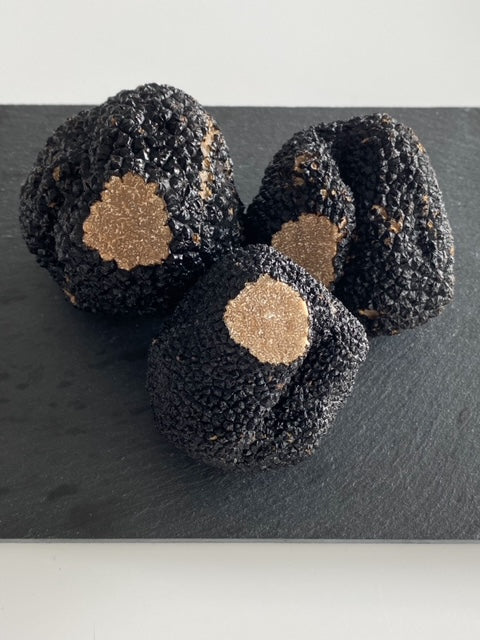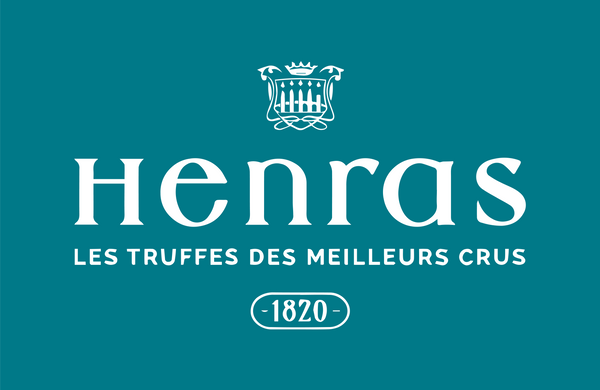
In this article, we discuss with Audrey Claveau , Quality Production Manager at Maison Truffes Henras.
Find this interview in pictures on our Youtube channel !
CAN YOU PRESENT YOURSELF AND TELL US YOUR CAREER?
"I am an agro-food engineer in Production and Quality. I graduated from an engineering school in Bordeaux.
After this diploma, I left for the Paris region in an industrial charcuterie. I stayed there for six years as Quality Manager and Production Manager. Afterwards, I came to the native southwest in Toulouse. There I stayed for four years as Production/Quality Manager in an artisanal biscuit factory which was founded by Laurence Rolland, the manager of the House. Following that, I'm back with her as Production/Quality Manager at Maison Henras."
WHAT IS “PRODUCTION”?

"Production is putting in place the human and material resources , i.e. the raw materials, to be able to manufacture the products.
So here we make canned truffles, but also we have a part of so-called by-products, where it is, for example, oil with truffles inside. It is both truffle preserves and derived products."
HOW IS THIS WORK ORGANIZED WITHIN THE HOUSE?
"Here, it's in three stages. We have a first phase which is the reception of the fresh truffle , so this truffle, it is in the ground. Then, we have a " transformation of the fresh truffle " part into canned truffles. And after, these " canned truffles ", we will transform them again to make finished products, or derived products."
WHAT ARE THE MAIN STANDARDS TO RESPECT?
"Like any agri-food company, there are hygiene standards to be respected . These are European regulations, so for us it is the " Hygiene package " and for example the « INCO » regulation, for labelling. But we have things that are much more specific, specific to truffle canning, specific to canned foods themselves, and so there we have good practice guides to respect, to follow, to guarantee a healthy product for the consumer."
WHAT ARE THE STEPS CONCERNING TRUFFLES?
"For the truffle, as it is in several stages, we receive it fresh. We have two types of truffles: the winter truffle, the black truffle and the summer truffle . In any case, the truffle arrives in the ground, it is dirty, it must be cleaned. This is Marc's part, who will take care of cleaning each truffle one by one, with the equipment available.

Once he has cleaned them, they will drain and then they will be picked up by Christophe, who will take care of taking them one by one and cutting them . He will remove a small piece of skin on each edge of the truffle to look at the maturity of the flesh inside and which will help us to classify them into categories .
Thanks to the canifage, he will be able to classify into “nice extra”, “extra large caliber”, “extra small caliber”, “first choice”, “pieces”, “large pieces”, “small pieces”, “medium pieces”, “peels”. He makes classifications, and afterwards with Laurence, we intervene for the selection of these classifications that he has elaborated, to carry out the orders of the customers, because the customers will order “extras”, “first choices”, “pieces”. And we collect them, we make our selection, to be able to place the orders."
HOW DO WE MAKE SURE TO PROVIDE QUALITY PRODUCTS?
"To ensure quality, it's the visual side of the flesh. There's also the olfactory side: a truffle that doesn't smell is necessarily a truffle that isn't ripe , so we're not going to send it to our customers.
If we don't send them to our customers, they are still truffles that will be very good for canning, so it's not lost and we know that we're going to do something else with them on the side. So that's for the qualitative aspect of the truffle.
"Afterwards, we make cans, we still have regulations, to be able to ensure safe products for customers and we do checks: of products, bacteriological analyzes on them, checks, at the time of manufacture on how the boxes are closed. There are a whole lot of things that are put in place to guarantee a safe, healthy, compliant and good quality product to the customer . "
APART FROM FRESH TRUFFLE PERIODS, WHAT DOES YOUR DIVISION DO?
"The period in between, so between winter and summer, is the period when it's the quietest, so it allows us to make our by-products , such as truffle salt , truffle oil , but also all our finished canned products in which we don't put fresh truffles.
So there we have time to open all our tin cans to be able to shape the product they want at the customer's request.
From a quality point of view, I have other tasks to accomplish during these periods, in connection with the sales department, marketing, R&D...
Everyone is multitasking, so we're always busy and that's good!"

